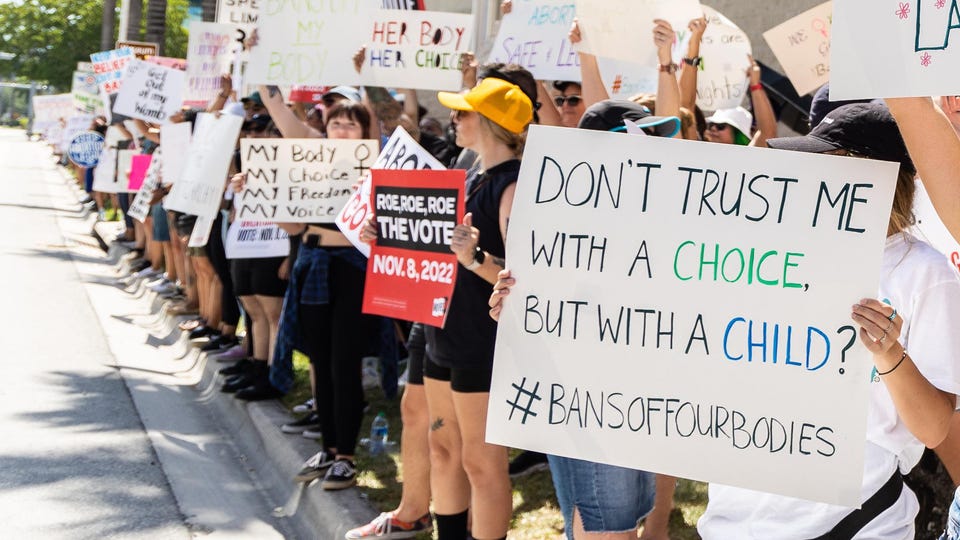Breaking Business Appeals Court Blocks Florida Minor From Getting An Abortion Alison Durkee Forbes Staff New! Follow this author to stay notified about their latest stories. Got it! Aug 16, 2022, 01:00pm EDT | Share to Facebook Share to Twitter Share to Linkedin Topline A Florida appeals court affirmed Monday a lower judge’s ruling that a 16-year-old minor in the state cannot get an abortion, based on a law requiring parental consent for minors, forcing the teenager to carry her pregnancy to term as such consent laws come under increasing scrutiny in the wake of the Supreme Court overturning Roe v. Wade.
Abortion rights activists protest on July 13 in Fort Lauderdale, Florida. Getty Images for MoveOn Key Facts A three-judge panel at the First District Court of Appeals in Florida sided with a circuit court judge in Escambia County, who ruled the plaintiff “had not established by clear and convincing evidence that she was sufficiently mature to decide whether to terminate her pregnancy,” as Florida law requires. The state’s parental consent law , enacted in 2020, lets minors seek a “judicial bypass” and get court permission to get an abortion if they can’t get consent from a parent or guardian.
The judges said their decision was based on the fact that Florida law only allows them to overturn the lower court’s ruling if there was any “abuse or discretion”—rather than because of any actual evidence in the case—and the circuit judge’s ruling was “neither unclear nor lacking. ” The plaintiff, who was 10 weeks pregnant and identified only as Jane Doe 22-B, told the court “she ‘is not ready to have a baby,’ she doesn’t have a job, she is ‘still in school,’ and the father is unable to assist her,” First Circuit Judge Scott Makar noted in his opinion concurring and dissenting in part with the court’s ruling. While the trial court judge rejected the request, she left open the possibility that Doe “may be able, at a later date, to adequately articulate her request” and ask the court again to terminate the pregnancy, and Makar noted the plaintiff was “under extra stress at the time due to a friend’s death.
” Because of this, Makar argued that the appeals court should have let the case go back to the lower court so it could consider the matter again, but he was overruled by the other two judges. Surprising Fact The plaintiff in the case was denied an abortion even after stating her legal guardian “is fine with what [she] wants to do,” Makar noted. If the guardian had stated that in a written waiver, it would have allowed Doe to obtain an abortion without going to court.
It’s unclear why she sought the court’s permission instead of her guardian’s, and whether seeking her guardian’s written permission could be a way for her to still terminate her pregnancy. Big Number 36. That’s the number of states that have parental consent laws in place for abortions, according to the pro-abortion rights Guttmacher Institute, and 35 have a “judicial bypass” provision like Florida’s that allows minors to seek permission in court.
Some of those laws are now nullified, however, given that a slew of states have now banned abortion entirely in the wake of the Supreme Court overturning Roe v. Wade. Chief Critic “Instead of trusting and listening to her, the state forces her to give birth,” Florida state Rep.
Anna Eskamani (D) tweeted Monday in response to the court ruling against Doe, later adding Tuesday the state’s parental policy is “cruel for the sake of being cruel and all designed to control people. ” Tangent The case comes after another high-profile instance of a Florida minor seeking an abortion in court in January. In that case , a lower judge initially denied the minor’s request, using her low GPA as a justification for why she was not mature enough to terminate the pregnancy.
The Second Circuit Court of Appeals then overturned that judge’s ruling, however, and granted the waiver for an abortion. Key Background Florida is now one of the only states in the Southeast where abortion remains largely permissible, though the state now bans abortions after 15 weeks of pregnancy, and has been a major access point for abortions as neighboring states have banned the procedure. Americans ages 19 and under made up 8.
9% of all abortion patients nationwide in 2019, according to the Centers for Disease Control and Prevention, and NPR notes the Supreme Court overturning Roe v. Wade and parental consent laws have now made it increasingly hard for many minors to access care. Minors traveling out of state to obtain abortions may have to avoid states where the procedure is legal but requires parental consent, for instance, giving them fewer options of where to go.
Teenagers like Doe who are denied abortions in their own states also face additional logistical barriers when it comes to traveling out of state for an abortion as compared with adults, like a lack of income or transportation. Further Reading Appeals court blocks abortion under Florida consent law (Orlando Sentinel) Long uncertain, young people’s access to abortion is more complicated than ever (NPR) Adolescents faced obstacles getting abortions. The Supreme Court just made it harder (NPR) How hard is it to get a court-approved abortion? For one teen, it came down to GPA.
(Washington Post) Follow me on Twitter . Send me a secure tip . Alison Durkee Editorial Standards Print Reprints & Permissions.
From: forbes
URL: https://www.forbes.com/sites/alisondurkee/2022/08/16/appeals-court-blocks-florida-minor-from-getting-an-abortion/



